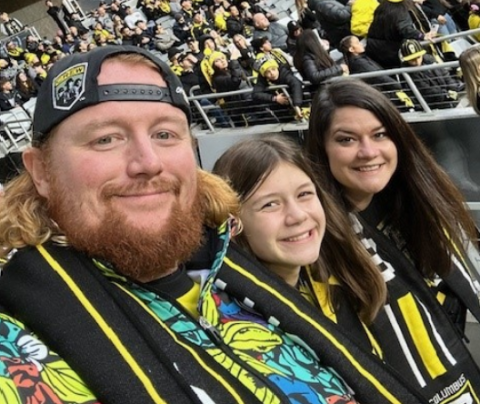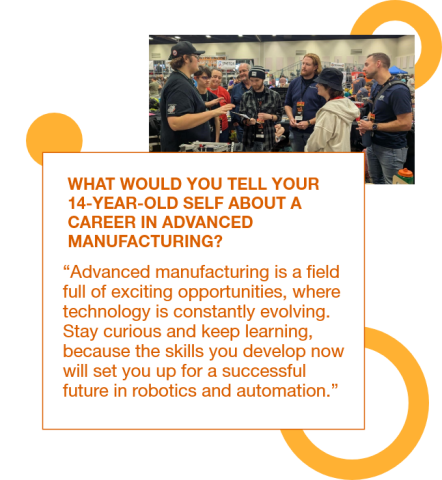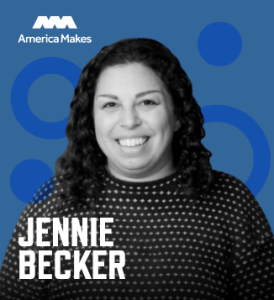
Veteran, Automation Educator, Volunteer
For Corey Adams at Universal Robots, an ARM Institute member, the path to becoming Educational Program Manager didn’t start with a degree in robotics or formal certifications. It started with grit, curiosity, and a hands-on approach. After completing military service, this professional didn’t follow a traditional route into the automation industry. Instead, Corey joined a robotics integrator without any prior experience. A headhunter saw potential, and with determination, long hours, and constant learning, that opportunity turned into a thriving career.
Working alongside experts in everything from welding systems to Hollywood special effects, the real-world integration work was challenging and exhilarating. That early exposure laid a strong foundation in robotics, fueling both technical expertise and a drive to keep learning. It wasn’t long before a desire to give back took root for Corey. Volunteering in local schools and colleges became a way to introduce young minds to the possibilities in automation. What started as a side project quickly grew into a central mission.
Corey has a Bachelor of Technical Management from DeVry University and an M.B.A. from Keller Graduate School of Management of DeVry University. Now, as Educational Program Manager at Universal Robots, Corey supports students, educators, and institutions nationwide. By leading workshops, training sessions, and webinars, Corey ensures that future engineers and technicians have the skills needed in today’s industry. Corey’s work bridges the gap between classrooms and factories, equipping students with practical knowledge and hands-on experience. Further, the training that Corey leads at Universal Robots has been evaluated and endorsed by industry experts through the ARM Institute’s Endorsement program on RoboticsCareer.org, meaning that the training is proven to give students the skills they need for a robotics career in manufacturing.
This career story shows that transitioning from the military to manufacturing isn’t just possible—it can be powerful. With problem-solving skills, adaptability, and initiative, veterans and newcomers alike can carve out a place in automation. Corey Adams is a Modern Maker.
Q&A with Corey
How did you find your way to working in advanced manufacturing?
After leaving the military, I moved back home and returned to working on the farm. I knew it wasn’t a long-term career path for me, so I worked during the day while attending college at night for project management, all while searching for new opportunities.
I eventually landed an interview with a local robotics integrator that was looking for a project manager to oversee their integration projects. Coming from a small rural county in Ohio, robotics had never been on my radar—I knew nothing about it. But I was excited about the opportunity and determined to prepare. I spent hours researching everything I could about robotics and automation, trying to gain as much knowledge as possible before my interview.
I got the job, and from day one, I knew I had to develop new technical skills to succeed in automation. I already had strong soft skills, but I focused heavily on learning the technical side of robotics, setting the foundation for my career in the industry.


What is the most challenging part of your job?
Technology is advancing faster than ever and staying ahead in automation and robotics requires continuously updating skills and training. It’s essential to stay engaged with emerging technologies and understand how they’re shaping the industry—not just in manufacturing, but across a wide range of applications. Automation and robotics are expanding beyond the factory floor, and developing a program that bridges manufacturing integration with broader automation and robotics knowledge is key to preparing the workforce for the future.
What is the best part of your job?
Seeing the impact on students is incredibly rewarding. It’s amazing to watch where they start and then see them graduate high school or college, stepping into high-paying careers with a strong understanding that their learning journey is just beginning. Nothing brings me more joy than seeing their smiles and hearing how this experience has changed their lives—sometimes even breaking cycles of generational poverty. Some of the most meaningful moments come from the handwritten letters I receive from students, sharing their gratitude and stories of how robotics and automation have transformed their futures.
What would people be surprised to learn about manufacturing or your role in manufacturing?
I didn't receive any formal training in automation or robotics. My background is in marketing and project management, not engineering. However, once I entered the field of robotics, I recognized that my strong soft skills provided the perfect foundation to succeed and excel.
What advice do you have for someone new to the industry or considering manufacturing as a career?
To keep an open mind. Automation and robotics are not just for manufacturing anymore. They’re making waves in agriculture, healthcare, and plenty of other industries. There are tons of opportunities out there if you're willing to explore.
What makes you excited to go to work on Mondays?
Being in the automation field is exciting with all the rapid changes in technology. Constant innovation and the ability of automation to reshape industries make every day a new adventure.
What are the three most important skills for your job?
The three most important skills for my role are adaptability, continuous learning, and generosity.
If you didn’t have to work, how would you spend your day?
I’d spend my time outdoors working on personal projects, like restoring a vehicle or learning something new, while also enjoying quality time with my family. I’d make sure to find moments to relax by the water, whether it’s fishing or just unwinding, counting the waves.
What activity gives you the most energy?

For me, the people make the experience, not the activity itself. Some of the most enjoyable moments have been when I stepped outside my comfort zone and tried something new with friends and family.
What hobbies make you better at your career?
Two years ago, I decided to take on a full restoration project of a 1979 F250. This was a major learning curve for me, as I didn’t have the skills at the time. But as I worked on the truck, I had to seek out tools and resources to help me not only disassemble it but also tackle the bigger task of putting it back together. This experience helped me draw motivation from how we learn to become a mechanic and how some of these strategies can be applied in the field of automation.
How does the work you do impact the world?
My work at Universal Robots gives people the opportunity to explore automation and robotics by helping them gain the fundamental skills around the technology, opening doors to new possibilities and careers in a rapidly evolving field.




